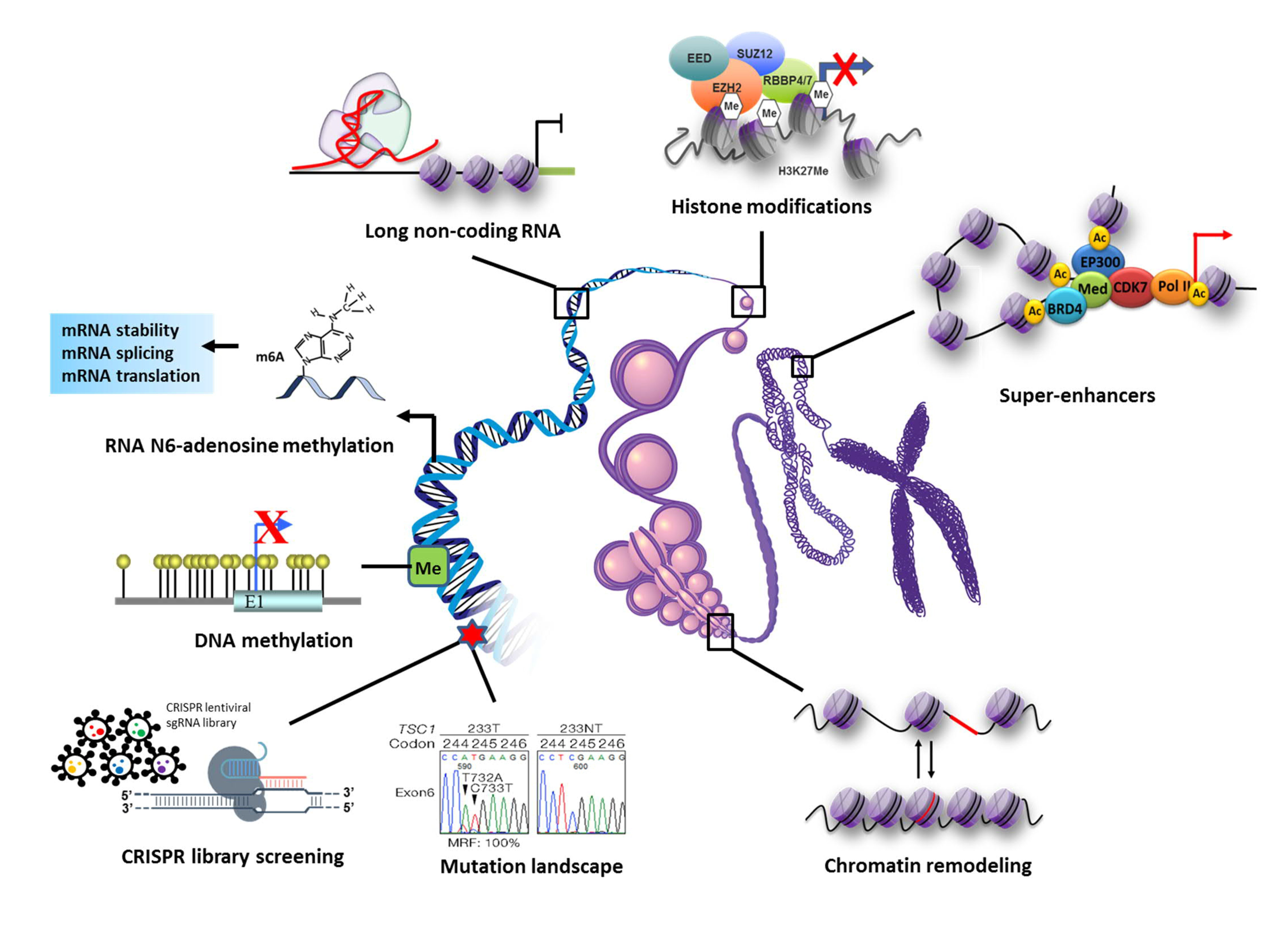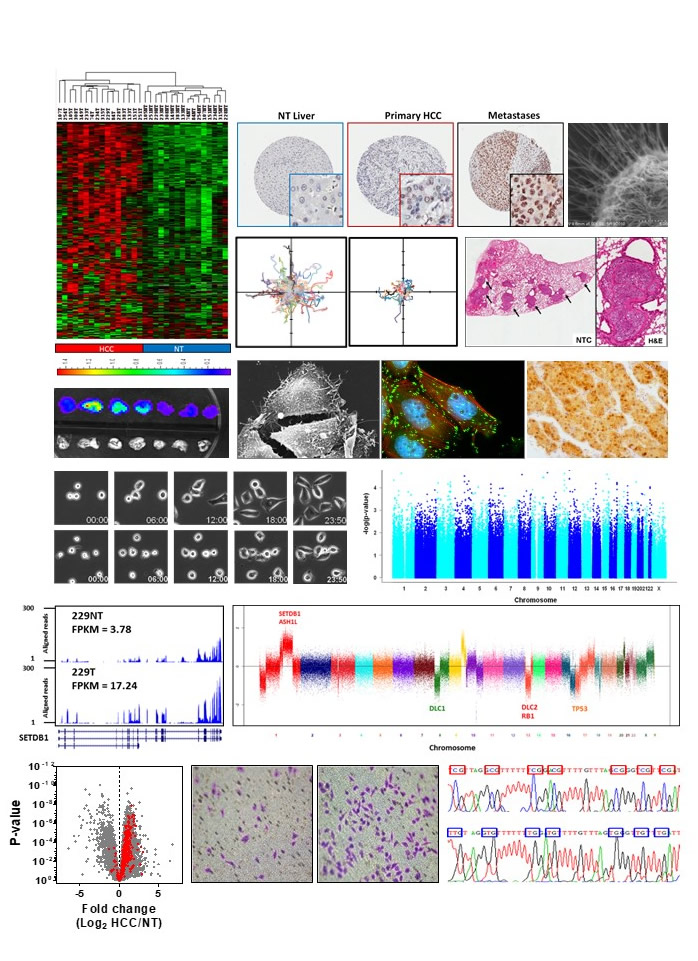Professor WONG Chun Ming, Jack

Professor
Cancer genetics and epigenetics
Molecular pathogenesis of liver cancer
- BSc (Hons), MMedSc, PhD (HK)
personal homepage: www.jackwonglab.com
Research Area
Cancer genetics and epigenetics
Cancer is a major health burden and a leading cause of death worldwide. Carcinogenesis is a process whereby cells acquire traits that enable them to evade the constraints of normal proliferation control. Despite great efforts and advancements have been made in the past decades in delineating the underlying molecular mechanisms, knowledge on the process of carcinogenesis is far from complete. Cancer is believed to be initiated by genetic lesions, such as point mutation and chromosome gain/deletion, which could lead to aberrant activation of proto-oncogenes and inactivation of tumor suppressor genes. The recent advancement of high-throughput sequencing technologies enable the researchers to decipher the genetic alterations in cancer genome and to identify novel driver mutations. Recently, growing evidences have suggested that epigenetic deregulation is playing an equally important role in human carcinogenesis. Epigenetics, as implied by the Greek prefix, epi- (means "in additional to"), refers to an additional regulatory layer on top of the genetic information stored as DNA sequences. In human genome, 146bp DNA wrapped around core histone proteins to form nucleosome, the basic unit of chromatin which will further condense to form chromosomes during metaphase of cell cycle. Epigenetic regulation is principally mediated through various heritable modifications at nucleotide, histone, and chromatin levels, but without altering the DNA sequence per se. DNA methylation, histone modifications, and chromatin remodeling are three major mechanisms of epigenetic regulation in mammalian cells. The three epigenetic regulatory mechanisms work intimately to determine local higher-order chromatin structure, and thereby switching "on" and "off" gene expression across the genome. Epigenetic regulation is analogous to the "software package" of a computer that controls whether, when, and how the DNA "hardware" operates. Tightly controlled epigenetic regulation is essential for the establishment of lineage specific gene expression pattern during embryonic development and somatic cell differentiation, which enable multicellular organisms to generate different functional cell types with the same genome. Deregulated epigenetic machinery may lead to malignant transformation and cancer development.
Our current researches are centered on deciphering the genetic and epigenetic deregulations in liver cancer (Hepatocellular Carcinoma, HCC), which is one of the most common lethal cancers worldwide and is particularly prevalent in Hong Kong and mainland China.

Research Interests
Cancer Functional Genomics
Mutational landscape | Chromosomal abnormality | Super-enhancer landscape |3D genome Computational biology
Cancer Epigenomics
DNA methylation | Histone modifications | Chromatin remodeling | Histone chaperones | Epi-transcriptomics
Cancer Transcriptomics
Transcriptional regulation | MicroRNA | Long non-coding RNAs
CRISPR Technology
CRISPR-Cas9 based gene knockout, activation, interference, and epigenetic editing | CRISPR-Cas9 based base editing | Genome-wide CRISPR library screening

Major external funding supports
- Natural Science Foundation of Chin (NSFC) (2018)
- Health and Medical Research Fund (HMRF) (2018 two full grants)
- Health and Medical Research Fund (HMRF) (2017 two full grants)
- Research Grant Council-Theme-based Research Scheme (2016, Co-I)
- Research Grant Council-General Research Fund (2016)
- Health and Medical Research Fund (HMRF) (2016 two full grants)
- Natural Science Foundation of China (NSFC) (2015)
- Research Grant Council- General Research Fund (2015)
- Research Grant Council- General Research Fund (2012)
- Research Grant Council- General Research Fund (2008)
Student and PDF awards
CHAN For-Fan, Daniel (MPhil student 2018-now)
- Best presentation award. Research Postgraduate Retreat 2epartment of Pathology, The University of Hong Kong, 2019
WONG Lok-Sze, Ceci (PhD student 2017-now)
- Outstanding poster presentation award. 23th Research Postgraduate Symposium, Li Ka Shing Faculty of Medicine, The University of Hong Kong, Dec 2018, Hong Kong
SHEN Jialing (PhD student 2016 – now)
- YS and Christabel Lung Postgraduate Scholarship, March 2020
- EMBO Travel grant. EMBO Workshop 2019 - Histone chaperones: Structure, function and role in development and disease. Greece, October 2019
- Oversea Young Investigator Travel Scholarship. The 41st Annual Meeting of the Molecular Biology Society of Japan. 2018
- Tigris Educational Fund - Graduate Student Travel Scholarship 2018
- Best presentation award, Research Postgraduate Students Retreat, Department of Pathology, The University of Hong Kong, 2018
- Hong Kong PhD Fellowship (HKPF). Research Grant Council. 2016
CHEN Menguno, Maggie (PhD Student 2015- 2019, PDF 2019-now)
- Chen To Haan Prize for Research Postgraduate Students in Pathology 2018-2019
- Tigris Educational Fund - Graduate Student Travel Scholarship 2019
- YS and Christabel Lung Postgraduate Scholarship, April 2019
- YS and Christabel Lung Postgraduate Scholarship, June 2018
- Best presentation award, Research Postgraduate Students Retreat, Department of Pathology, The University of Hong Kong, 2017
- Outstanding poster presentation award. 21th Research Postgraduate Symposium, Li Ka Shing Faculty of Medicine, The University of Hong Kong, 2016
- Blue Ocean Basic Medical Research Fund, 2016
- Outstanding Poster presentation award. Hong Kong, Inter-University Postgraduate Symposium in Biochemical Science. 2016
- Blue Ocean Basic Medical Research Fund, 2015
LAW Cheuk-Ting, Dicky (PhD Student 2014- 2019, PDF 2019-now)
- YS and Christabel Lung Postgraduate Scholarship, April 2019
- Tse Family HKU-Cambridge Hughes Hall Scholarship, 2017
- Wong Ching Yee Medical Postgraduate Scholarship, 2017.
- Reaching Out Award 2017, HKSAR Government Scholarship Fund, 20147
- Tigris Educational Fund - Graduate Student Travel Scholarship 2017
- Best poster award. 4th International Anatomical Sciences and Cell Biology Conference, 2016
- Outstanding poster presentation award. 21th Research Postgraduate Symposium, Li Ka Shing Faculty of Medicine, The University of Hong Kong, 2016
- Best presentation award, Research Postgraduate Students Retreat, Department of pathology, The University of Hong Kong, 2016
- Poster presentation award, 20th Research Postgraduate Symposium, Li Ka Shing Faculty of Medicine, The University of Hong Kong, 2015.
- Blue Ocean Basic Medical Research Fund 2014
Dr. WEI Lai, Larry (PhD student 2012-2015; PDF 2015-2019)
- Health and Medical Research Fund (HMRF) Full grant 2019
- LINCS CMap Workshop Travel Grant, Connectivity Map Team, Broad Institute, Dec 2018, Boston, USA
- Best presentation award, Research Postgraduate Students Retreat, Department of pathology, The University of Hong Kong, 2015.
- Outstanding Poster presentation award, Hong Kong Inter-University Postgraduate Symposium on Life Science, 2015
Dr. TSANG Ho-Ching, Felice (PhD student 2010-2013; PDF 2013-2019)
- Health and Medical Research Fund (HMRF) Full grant 2018
- Health and Medical Research Fund (HMRF) Full grant 2017
- Travel award, Asian Pacific Association for the Study of the Liver (APASL) Single Topic Conference on Recent Advances in Prevention and Management of Cirrhotic Complications. 2016
- L’Oreal scholarship 2015, HKU-Pasteur Research Pole. 2014.
- Best presentation award, Research Postgraduate Students Retreat, Department of pathology, The University of Hong Kong, 2013.
Dr. FAN Ngo-Yin, Dorthy (PhD student 2009-2012)
- Best Presentation Award, 16th Research Postgraduate Symposium, Li Ka Shing Faculty of Medicine, The University of Hong Kong, 2011
Dr. AU Leung Kuen, Sandy (PhD student 2008-2011; PDF 2011- 2013)
- Best Presentation Award, 15th Research Postgraduate Symposium, Li Ka Shing Faculty of Medicine, The University of Hong Kong, 2010
- Young Investigator Award, 16th Hong Kong International Congress, 2009

Selected Publications
- Chen M and Wong CM. The emerging roles of N6-methyladenosine (m6A) deregulation in liver carcinogenesis. Mol Cancer 2020, 19:44, Review.(Corresponding author) (IF : 10.697)
- Shen J, Chen M, Lee D, Law CT, Wei L, Tsang FH, Chin DW, Cheng CL, Lee JM, Ng IO, Wong CC, Wong CM. Histone Chaperone FACT complex mediates oxidative stress response to promote liver cancer progression. Gut 2020. 69:329-342. (Corresponding author) (IF: 17.943)
- Wei L, Lee D, Law CT, Zhang MS, Shen J, Chin DW, Zhang A, Tsang FH, Wong CL, Ng IO, Wong CC, Wong CM, Genome-wide CRISPR/Cas9 library screening identified PHGDH as a critical driver for Sorafenib resistance in HCC. Nat Commun. 2019; 10: 4681. (Corresponding author) (IF: 11.878)
- Tsang FH, Law CT, Tang TC, Cheng CL, Chin DW, Tam WV, Wei L, Wong CC, Ng IO, Wong CM. Aberrant super-enhancer landscape in human hepatocellular carcinoma. Hepatology. 2019; 69:2502-2517. (Corresponding author) (IF: 14.971)
- Law CT, Wei L, Tsang FH, Chan CY, Xu IM, Lai RK, Ho DW, Lee JM, Wong CC, Ng IO, Wong CM. HELLS regulates chromatin remodeling and epigenetic silencing of multiple tumor suppressor genes in human hepatocellular carcinoma. Hepatology. 2019; 69:2013-2030. (Corresponding author) (IF: 14.971)
- Wong CM, Tsang FH, Ng IO. Non-coding RNAs in hepatocellular carcinoma: molecular functions and pathological implications. Nat Rev Gastroenterol Hepatol. 2018; 15:137-151. Review. (IF: 23.571)
- Chen M, Wei L, Law CT, Tsang FH, Shen J, Cheng CL, Tsang LH, Ho DW, Chiu DK, Lee JM, Wong CC, Ng IO, Wong CM. RNA N6-methyladenosine methyltransferase-like 3 promotes liver cancer progression through YTHDF2-dependent posttranscriptional silencing of SOCS2. Hepatology. 2018; 67:2254-2270. (Corresponding author) (IF: 14.791)
- Wei L, Chiu DK, Tsang FH, Law DC, Cheung CL, Au SL, Lee JM, Wong CC, Ng IO, and Wong CM. Up-regulation of histone methyltransferase G9a promotes liver cancer development and is a promising therapeutic target. J. Hepatol 2017, 67: 758. (Corresponding author) (IF: 18.946)
- Ho DH, Chan LK, Chiu YT, Xu IM, Poon RT, Cheung TT, Tang CN, Tang VW, Lo IL, Lam PW, Yau DT, Li MX, Wong CM, Ng IO. TSC1/2 mutations define a molecular subset of HCC with aggressive behaviour and treatment implication. Gut 2017, 66:1496-1506. (Corresponding author) (IF: 17.943)
- Chiu YT, Wong JK, Choi SW, Sze KM, Ho DW, Chan LK, Lee JM, Man K, Cherny S, Yang WL, Wong CM, Sham PC, Ng IO. Novel pre-mRNA splicing of intronically integrated HBV generates oncogenic chimera in hepatocellular carcinoma. J Hepaol 2016, 64:1256-64. (Corresponding author) (IF: 18.946)
- Wong CM, Wei L, Law CT, Ho DW, Tsang FH, Au SK, Sze KM, Lee JM, Wong CC, Ng IO. Up-regulation of histone methyltransferase SETDB1 by multiple mechanisms in hepatocellular carcinoma promotes cancer metastasis. Hepatology, 2016, 63:474-87. (Corresponding author) (IF: 14.971)
- Wong CM, Wei L, Au SL, Fan DN, Zhou Y, Tsang FH, Law CT, Lee JM, He X, Shi J, Wong CC, Ng IO miR-200b/200c/429 subfamily negatively regulates Rho/ROCK signaling pathway and suppresses HCC metastasis. Oncotarget. 2015; 6:13658-70. (Corresponding author) (IF: 5.168)
- Tsang FH, Au SL, Fan DH, Lee JM, Wong CC, Ng IO, Wong CM. HOTTIP, an oncogenic long non-coding RNA, is frequently up-regulated in hepatocellular carcinoma and is negatively regulated by tumor suppressive microRNA miR-125b. Liver Int. 2015; 35:1597. (Corresponding author) (IF: 5.542)
- Tsang FH, Au SL, Wei L, Fan DN, Lee JM, Wong CC, Ng IO, Wong CM MicroRNA-142-3p and microRNA-142-5p are down-regulated in Hepatocellular Carcinoma and have combinatory effects on HCC cell motility. Front Med 2015; 9:331-43. (Corresponding author) (IF: 1.847)
- Fan DN, Tsang FH, Au SL, Wong CC, Tam AH, Wei L, Lee JM, He X, Ng IO, Wong CM. Histone methyltransferase, suppressor of variegation 3-9 homolog 1, promotes hepatocellular carcinoma progression and is negatively regulated by microRNA-125b. Hepatology. 2013; 57:637. (Corresponding author) (IF: 14.971)
- Au SL, Wong CC, Lee JM, Wong CM, Ng IO. EZH2-mediated H3K27me3 involves in epigenetic repression of Deleted in liver cancer 1 in human cancers. PLoS ONE 2013; 8:e68226.(Corresponding author) (IF: 2.776)
- Wong CM, Kai AK, Tsang FH, Ng IO. Regulation of hepatocarcinogenesis by microRNAs. Front Biosci (Elite Ed). 2013; 5:49-60. Review. (IF: 3.736)
- Au SL, Ng IO and Wong CM. Epigenetic dysregulation in hepatocellular carcinoma: Roles of Polycomb group proteins. Front Med, 2013, 7:231-241. Review. (Corresponding author) (IF: 1.847)
- Au SL, Wong CC, Lee JM, Fan DN, Tsang FH, Ng IO and Wong CM. Enhancer of zeste homolog 2 (EZH2) epigenetically silences multiple tumor suppressor miRNAs to promote liver cancer metastasis. Hepatology 2012; 56:622. (Corresponding author) (IF: 14.971)
- Wong CM, Wong CC, Lee JM, Fan DN, Au SL, and Ng Sequential alterations of microRNA expression in hepatocellular carcinoma development and venous metastasis, Hepatology 2012; 55:1453. (Corresponding author) (IF: 14.971)
- Au SL, Wong CC, Lee JM, Fan DN, Tsang FH, Ng IO and Wong CM. Enhancer of zeste homolog 2 (EZH2) epigenetically silences multiple tumor suppressor miRNAs to promote liver cancer metastasis. Hepatology 2012; 56:622. (Corresponding author). (IF: 14.971)
- Wong CM, Wong CC, Lee JM, Fan DN, Au SL, and Ng Sequential alterations of microRNA expression in hepatocellular carcinoma development and venous metastasis, Hepatology 2012; 55:1453. (Corresponding author) (IF: 14.971)
- Gao P, Wong CC, Tung EK, Lee, JM, Wong CM, Ng IO. Deregulation of microRNA expression occurs early and accumulates in early stages of HBV-associated multistep hepatocarcinogenesis. J Hepatol. 2011; 54:1177. (Corresponding author). (IF: 18.946)
- Wong CC, Wong CM, Tung EK, Au SL, Lee, JM, Poon RT, Man K, Ng IO. The microRNA MiR-139 suppresses metastasis and progression of hepatocellular carcinoma by downregulating Rho-kinase 2. Gastroenterology 2011; 140:332.(Co-first author) (IF: 19.233)
- Chan KY, Wong CM, Kwan JS, Lee JM, Cheung KW, Yuen MF, Lai CL, Poon RT, Sham PC, Ng IO. Genome-wide association study of hepatocellular carcinoma in Southern Chinese patients with chronic hepatitis B virus infection. PLoS ONE 2011; 6: e28798. (Co-first author) (IF: 2.776)
- Wong CM, Wong CC, Ng YL, Au SL, Ng IO. Transcriptional repressive H3K9 and H3K27 methylations contribute to DNMT1-mediated DNA methylation recovery. PLoS ONE 2011, 6: e16702. (IF: 2.776)
- Wong CM and Ng IOL. Molecular pathogenesis of hepatocellular carcinoma. Liver Int. 2008; 28:160-174. Review. (IF: 5.542)
- Wong CM, Ng YL, Lee JM, Wong CC, Cheung OF, Chan CY, Tung EK, Ching YP, Ng IOL. Tissue factor pathway inhibitor-2 as a frequently silenced tumor suppressor gene in hepatocellular carcinoma. Hepatology 2007; 45: 1129. (IF: 14.971)
- Wong CM, Yam JW, Ching YP, Yau TO, Leung TH, Jin DY, Ng IO. Rho GTPase activating protein DLC1 (deleted in liver cancer) suppresses cell proliferation and invasion in hepatocellular carcinoma. Cancer Res. 2005; 65: 8861. (Co-first author). (IF: 8.378)
- Wong CM, Lee JM, Ching YP, Jin DY, Ng IO. Genetic and epigenetic alterations of DLC-1 gene in hepatocellular carcinoma. Cancer Res. 2003; 63: 7646. (IF: 8.378)
- Ching YP, Wong CM, Chan SF, Leung TH, Ng DC, Jin DY, Ng IO. Deleted in liver cancer (DLC) 2 encodes a RhoGAP protein with growth suppressor function and is underexpressed in hepatocellular carcinoma. J. Biol. Chem. 2003; 278:10824. (Co-first author) (IF: 4.106)
- Wong CM, Lee JM, Lau TC, Fan ST, Ng IO. Clinicopathological significance of loss of heterozygosity on chromosome 13q in hepatocellular carcinoma. Clin. Cancer Res. 2002; 8: 2266. (IF: 8.911)
- Wong CM, Fan ST, Ng IO. ß-catenin mutation and overexpression in hepatocellular carcinoma: Clinicopathologic and prognostic significance. Cancer 2001; 92: 136-45. (IF: 6.102)



